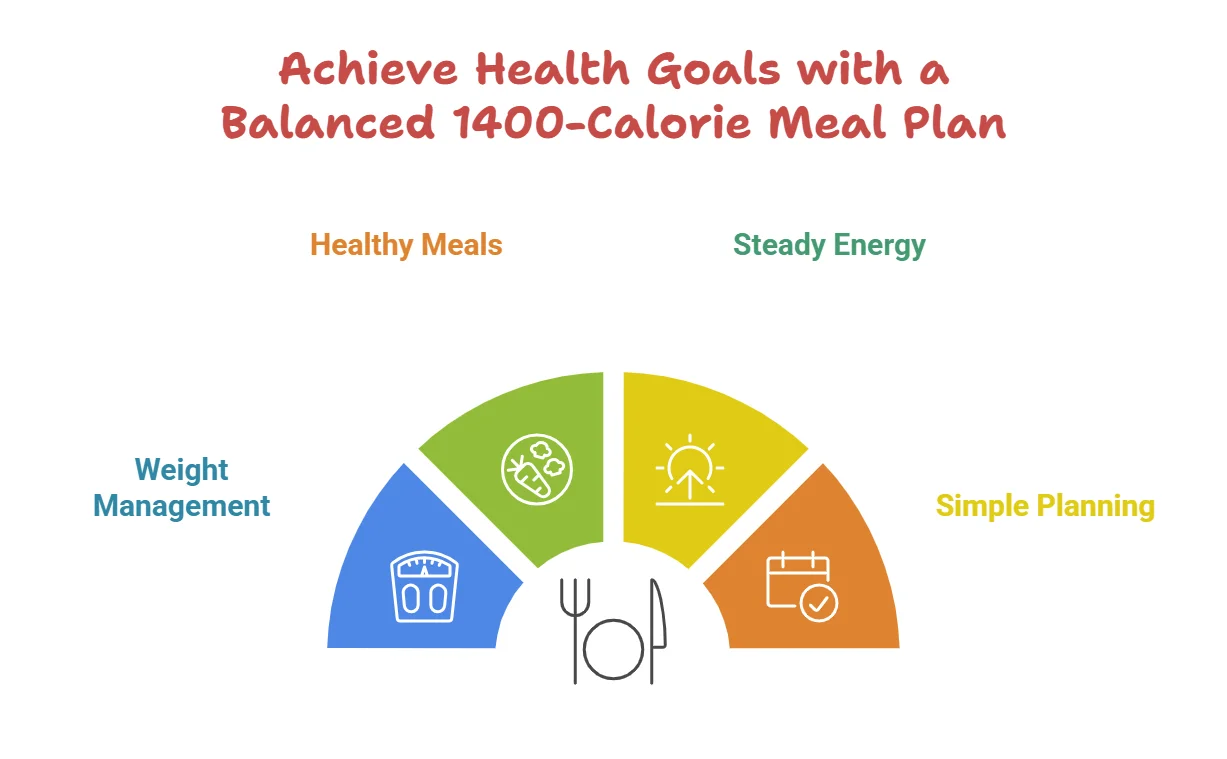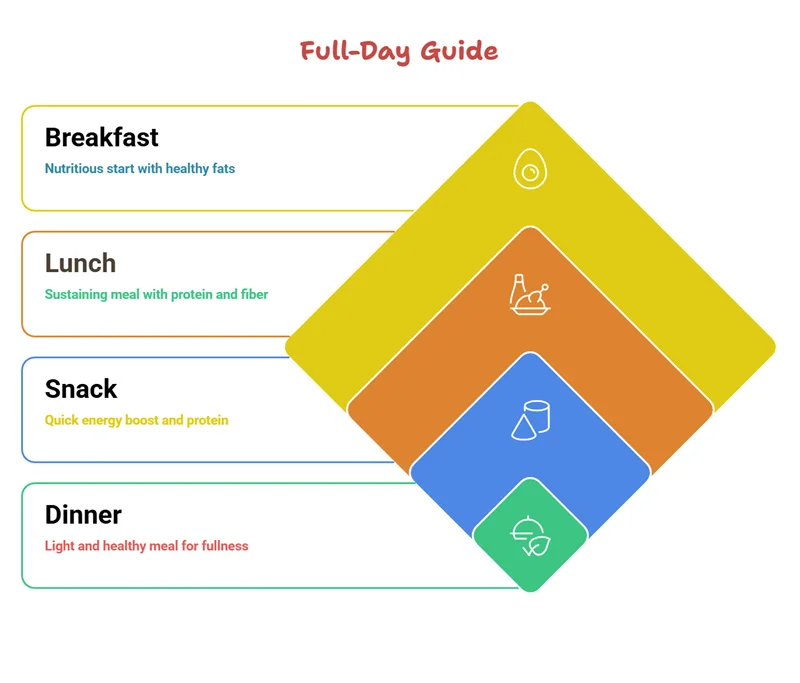
1400 Calorie Meal Plan | Balanced Nutrition for Daily Wellness
2025-05-28
A Meal Planner helps you organize nutritious meals, ensuring you get the right balance of proteins, healthy fats, and fiber without overeating. A well-structured 1400-calorie plan keeps you energized, supports weight management, and prevents unhealthy food choices. With proper planning, every meal is both satisfying and easy to prepare, making healthy eating a seamless part of your day.
Introduction
Eating the right amount of food each day helps your body stay healthy and full of energy. A 1400-calorie meal plan is a simple way to manage your food intake while making sure you get all the nutrients you need.
Many people struggle with meal planning. They don’t know what to cook, how much to eat, or how to keep their meals balanced. That’s where Foodsie Meal Planner helps! It makes meal planning easy by giving you ready-to-use 1400-calorie meal ideas, so you always know what to eat and how to keep your meals balanced.
This guide will help you understand how a 1400-calorie meal plan works and how it can benefit you.
What is a 1400-Calorie Meal Plan?
A 1400-calorie meal plan is a structured way to eat 1400 calories per day while ensuring your meals are healthy and filling. It includes the right amount of protein, carbohydrates, and healthy fats so you stay full and energized.
Why Follow a 1400-Calorie Meal Plan?

This meal plan is ideal for:
- People who want to lose or maintain weight.
- Anyone who needs healthy, balanced meals.
- Those who want steady energy all day.
- People who like simple meal planning.
This plan gives you just enough food to feel satisfied, without overeating.
How Foodsie's Meal Planner Makes It Easy
Planning meals can feel hard, but Foodsie's Meal Planner makes it simple:
- Personalized Plans: Pick your favorite foods and diet goals.
- Easy Recipes: Get simple meal ideas that match your calorie needs.
- Calorie Tracking: Foodsie shows you how many calories each meal has.
- Quick Meal Swaps: Change ingredients if you want something different.
- Grocery List: Foodsie creates a shopping list for you.
Foodsie helps you plan better so you can eat well without stress!
1400-Calorie Meal Plan: Full-Day Guide

Here is an easy meal plan with 1400 calories. These meals are filling, tasty, and simple to make.
Breakfast (400 Calories) – A Great Start
Scrambled Eggs with Toast & Avocado
- 2 scrambled eggs 140 calories
- 1 slice whole-grain toast 80 calories
- ¼ avocado, mashed 60 calories
- 1 tsp olive oil 40 calories
- ½ cup mixed berries 80 calories
Why This Meal is Good
✔ Eggs give you protein for energy.
✔ Avocado & olive oil have healthy fats.
✔ Berries add fiber and vitamins.
Lunch (450 Calories) – Stay Full Longer
Grilled Chicken Salad with Quinoa
- 3 oz grilled chicken breast 120 calories
- ½ cup cooked quinoa 110 calories
- 1 cup mixed greens 15 calories
- ¼ cup cherry tomatoes 10 calories
- 1 tbsp olive oil + lemon juice 80 calories
- 1 tbsp feta cheese 50 calories
- 1 tbsp sunflower seeds 60 calories
Why This Meal is Good:
✔ Chicken gives you protein to keep you full.
✔ Quinoa provides long-lasting energy.
✔ Veggies add fiber and vitamins./
Snack (200 Calories) – Quick & Tasty
Greek Yogurt with Almonds & Honey
- ½ cup plain Greek yogurt 80 calories
- 1 tbsp honey 60 calories
- 6 almonds 60 calories
Why This Snack is Good:
✔ Yogurt has protein and helps digestion.
✔ Honey adds natural sweetness.
✔ Almonds have healthy fats and crunch.
Dinner (350 Calories) – Light & Healthy
Baked Salmon with Veggies
- 4 oz salmon fillet 200 calories
- 1 cup steamed broccoli 50 calories
- ½ cup brown rice 100 calories
Why This Meal is Good:
✔ Salmon has healthy fats for your heart.
✔ Veggies provide fiber and nutrients.
✔ Brown rice keeps you full longer.
Simple Tips to Follow Your Meal Plan
Here are easy ways to stick to your plan:
- Plan Your Meals: Use Foodsie’s Meal Planner to decide what to eat ahead of time.
- Cook in Advance: Make your food early to save time and effort.
- Drink Water: It helps you stay full and avoid extra eating.
- Eat When Needed: If you feel hungry, have a healthy snack.
- Choose What You Like: Swap meals with foods you enjoy.
Get Started with Foodsie's Meal Planner Today!
Want to make meal planning easy? With Foodsie's Meal Planner, you can:
- Create a 1400-calorie meal plan in minutes.
- Get meal ideas that fit your lifestyle.
- Save time with an automatic grocery list.
- Start today and take control of your health!
Sign Up Now & Plan Your Perfect Meals!
Conclusion
A 1400-calorie meal plan is an effective way to manage health and weight while still enjoying meals that feel complete and satisfying. When your plate includes the right mix of protein, fiber, healthy fats, and whole grains, you get consistent energy that lasts through the day without unnecessary cravings. This approach is not about restriction but about structure making sure each meal supports your body’s needs and fits your lifestyle. With thoughtful planning and a focus on variety, eating well becomes easier, more enjoyable, and something you can maintain long term.
Frequently Asked Questions
1. Can a woman survive on 1400 calories a day?
Yes, a woman can survive on 1400 calories a day, but it may feel too low for many depending on age, height, weight, and activity level. While it can lead to weight loss in the short term, eating this little for a long time might cause fatigue, nutrient gaps, and loss of muscle if not carefully planned.
2. Is 1400 calories too low for a woman?
For some women, especially those who are active or taller, 1400 calories can be too low because it may not provide enough energy for daily needs. It is usually considered a low-calorie diet and should be followed with care to avoid slowing metabolism or lacking essential nutrients.
3. How many grams of protein per day on a 1400 calorie diet?
On a 1400-calorie diet, aiming for about 55–90 grams of protein per day is ideal to maintain muscle, support recovery, and help you stay full. This range can be met through foods like eggs, chicken, fish, beans, tofu, and dairy spread across your meals.